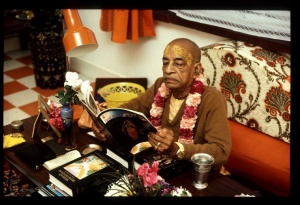SB 6.12.18

A.C. Bhaktivedanta Swami Prabhupada
TEXT 18
śrī-śuka uvāca
indro vṛtra-vacaḥ śrutvā
gatālīkam apūjayat
gṛhīta-vajraḥ prahasaṁs
tam āha gata-vismayaḥ
SYNONYMS
śrī-śukaḥ uvāca—Śrī Śukadeva Gosvāmī said; indraḥ—King Indra; vṛtra-vacaḥ—the words of Vṛtrāsura; śrutvā—hearing; gata-alīkam—without duplicity; apūjayat—worshiped; gṛhīta-vajraḥ—taking up the thunderbolt; prahasan—smiling; tam—unto Vṛtrāsura; āha—said; gata-vismayaḥ—giving up his wonder.
TRANSLATION
Śukadeva Gosvāmī said: Hearing the straightforward, instructive words of Vṛtrāsura, King Indra praised him and again took the thunderbolt in his hand. Without bewilderment or duplicity, he then smiled and spoke to Vṛtrāsura as follows.
PURPORT
King Indra, the greatest of the demigods, was astonished to hear the instructions of Vṛtrāsura, who was supposed to be a demon. He was struck with wonder that a demon could speak so intelligently. Then he remembered great devotees like Prahlāda Mahārāja and Bali Mahārāja, who had been born in the families of demons, and thus he came to his senses. Even so-called demons sometimes have exalted devotion for the Supreme Personality of Godhead. Therefore Indra smiled reassuringly at Vṛtrāsura.